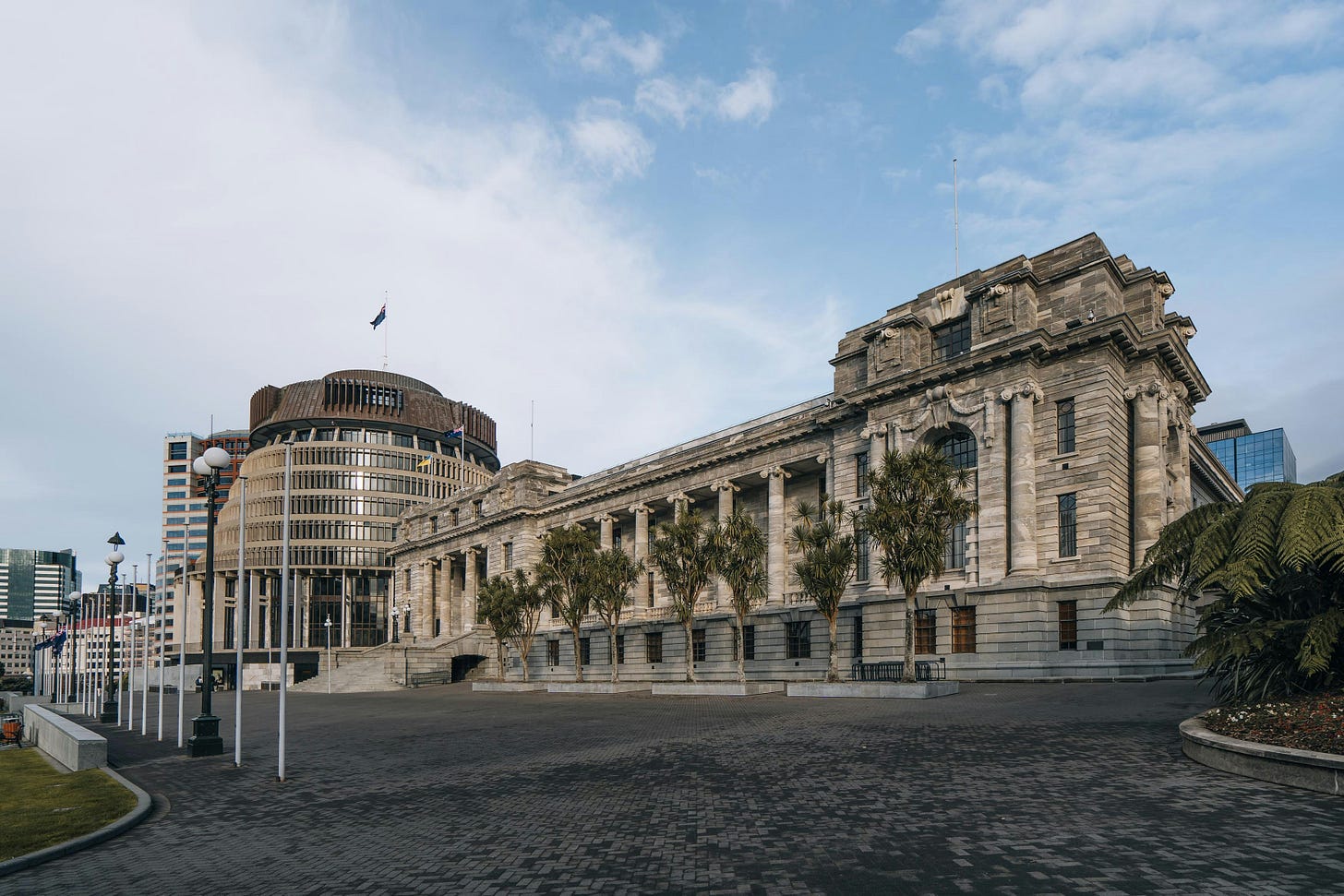Becoming an independent country
1/3 of a series of mostly non-partisan political reforms which would be cool and fun to do
After a hiatus since March, I’m back, and ready to make a final sprint to the twenty posts I committed to writing while in the UK ahead of the grand return to New Zealand in November.
This is the first in a set of three ‘packages’ of non-partisan policy reforms for Aotearoa, which I’ve been mulling over the last few weeks. Feel free to read them as one, or seperately, as you see fit.
Something about living in the domain of the British monarchy has given me much stronger feelings on this essay’s topic than I’ve had in the past. Perhaps as part of the crystallisation of ‘Kiwi identity’ I’ve increasingly come to feel? Though a little hard-to-notice in New Zealand, that identity is evident here in the UK even if only by distinction from British culture. I feel more 'Kiwi’ now than ever before.
That is, of course: becoming a republic.

I. Becoming a republic
Most contemporary leaders of NZ political parties, and most New Zealanders1, believe New Zealand will eventually become a republic. I expect more robust polling would show that a significant majority are ‘soft republicans’, content with a shift to independence in the coming decades, but not particularly inclined to make it an immediate priority. This is clearly the ‘correct’ view.
But in the absence of any action in the near future, even tentative foundation-laying action, how long do you think we’ll keep saying "not right now, not while we have other priorities like COVID-19/the cost of living crisis/healthcare system dysfunction/a historic infrastructure deficit/climate change/while we're laser focused on delivery/while this/while that"? Thirty years? Fifty?
Yes, obviously, a 'nice to have' like becoming a republic is hard for a politician to ever prioritise, given the existence of literally needing to govern a country, and the optics of a vanity project without a clear rationale.
But I’m hoping many of us can agree—this should happen at some point in the next couples of decades, right? Seems about time for us to ‘grow up’ as a country?

In my head, this is an easy problem to solve. Get some bipartisan consensus going and set aside a small appropriation for this kicking off in five or so years. Say, the 2030/31 financial year. Give a pack of lawyers five or so years from then to quietly beaver away at how they’d replace the Crown in various legislation, and tackle tricky issues like codifying te Tiriti o Waitangi in a new constitutional framework, so we’re in a position to think more seriously about this in the mid-2030s.
We're not paying for it right now, we're just collectively committing to pay for it in a few years regardless of who happens to be in charge then. Giving us plenty of time to plan other government expenditure around what I am sure will be a relatively small-fry project, in the scheme of things. Agencies can do some minimal prep ahead of that out of their baselines. Sorted.
Do it now, so we don't keep kicking the can down the road—but time-discount it to the future, when we're not in midst of a cost of living crisis (or whatever the next crisis is).
And then, in 2035-ish once the hard background work has been done by the public servants and we’ve had a robust public discussion about things in the preceding years, we have an official referendum to decide whether to make the switch.
It’ll be a fully-fledged, worked-through proposal, ideally with wide bipartisan consensus given the significance to the country (and lack of signficance from a policy perspective). Schedule the big day itself for 1 January 2040 so we don’t feel unduly pressured. Again, there’s no rush.
II. other bits and pieces
I don’t know nearly enough to comment substantively on the legal or constitutional side of things. From my limited perspective, the best way to achieve this transition is to basically keep everything as unchanged as possible.
That means keeping te Tiriti o Waitangi as a core constitutional document in New Zealand—part of our ‘unwritten’ constitution—and otherwise lifting and shifting the representation of the Crown across to the Government of New Zealand to the extent possible.
Tying a contemporary debate about the modern purpose of te Tiriti to the proposal of becoming a republic is a surefire way to ensure it doesn’t happen anytime soon. Which would be a shame, I think, because becoming a republic and further developing our democratic system feels like a very useful warm-up to having that trickier conversation later on.
a new Head of State
Part of what makes our system of governement so effective is the unabashed concentration of power in Parliament, unlike the intentionally byzantine checks and balances of other democracies. This is an ironic position considering the next essay’s proposal of a new (albeit weak) bicameralism for NZ’s Parliament, but I stand by it.
Constitutional monarchies—like the British, Japanese, Swedish, Norwegian monarchs—have an almost solely ceremonial role acting as a 'binder' of society rather than a political figure. This is a very good thing.
Few countries have successfully supplanted that legacy role of the monarch with an appropriately non-partisan elected figure. The President of Germany and the President of Ireland are some of the closest examples, with limited executive powers and a largely symbolic role representing the unity and values of German and Irish citizens.
But New Zealand shouldn’t have a President. The vibes are off. I’d hazard a guess to say a significant portion of the country have such a visceral negative reaction to the term that a question phrased “Should NZ be a republic, with a President as Head of State?” would poll much worse than one phrased “Should NZ be a republic, with a Kiwi as Head of State?”
Thus, I propose the Governor-General be replaced by the Kaitiaki o Aotearoa/Guardian of New Zealand.2 A ceremonial head of state position reserved for highly-respected New Zealanders, representing our country—lands, waters, and skies—on behalf of all who live here.
They would have a solely domestic focus, with the international sphere left to the Prime Minister as the functional and political head of our government. By New Zealanders, for New Zealanders; building shared values and (healthy) national pride amongst our communities. Representing the best of what it means to be a Kiwi.
We’d probably keep the same appointment process for the Governor-General, by the Prime Minister in close consultation with other party leaders, and have them officially approved by a vote in Parliament. As a ceremonial role without major political function, bipartisan consensus should be fundamental to the appointment and confirmation process.
The Guardian of New Zealand would be appointed on a 4-year term, set in middle of political term (more to come on the 4-year political term in part two), and able to serve up to eight years in the role if invited by the Prime Minister after their first term.
And, of course, a transfer of most of the current roles and responsibilities currently fulfilled by the Monarch of New Zealand or the Governor-General to the office of the Kaitiaki o Aotearoa. This would include pulling across the existing honours system managed (in practice) by Cabinet Office, wherein any pre-existing honours would be unchanged and recognised as ‘equivalent’ to the new honours system coordinated by the head of state’s office.
III. miscellaneous matters
A new flag for Aotearoa New Zealand. Yes, this went rather poorly last time. Obviously we would want to take inspiration from other jurisdictions where it ended up working out (Canada springs to mind), and some ‘lessons learned’ from 2014:
getting political parties to agree ahead of time not to muck it up for political reasons, given the broader context of becoming a republic makes it more credible/serious this time around
better vexillogy/design input from the beginning, with a broader set of designs including iconography beyond the silver fern (we want a flag that represents our country… not just a chance to push the Fernmark overseas)3
a significantly improved multi-round elimination, after beginning with a much better opening pool of candidates
Probably keep the national anthem as-is for now. No need to do this all at once.
Remain a member of the Commonwealth and maintain strong (just independent, now) relations with the UK and other Commonwealth countries.
part two to follow
In polling from May 2023, the clear view from New Zealanders was that a referendum tomorrow would result in the status quo, but a majority thought that in ten years it would result in a republic. 75% thought “in an ideal world we wouldn’t have a monarchy, but there are more important things for the country to deal with.”
Forgive my inexpert use of Te Reo. To me, the principle of Kaitiakitanga is perhaps the fundamental value of New Zealand; and guardianship of our lands, waters, and skies on behalf of all New Zealanders reflects exactly the sort of ceremonial role/purpose I’d want in a symbolic head of state.
Maybe the silver fern remains a big part of it! But equally, can’t you imagine a combination of a pōhutakawa flower, pounamu, a Chatham Island tāiko… something from Rakiura… I mean the options are endless, and far more unique to us.





